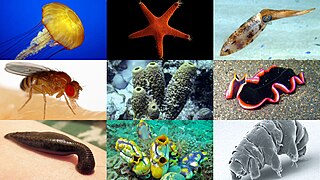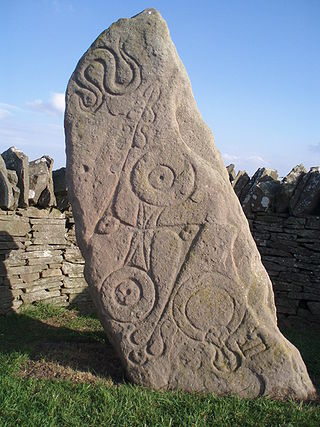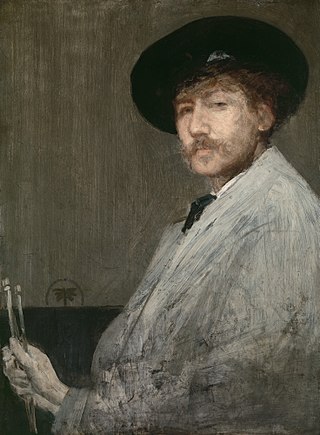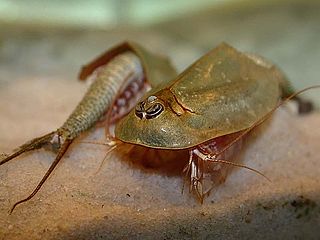
Abraham Lincoln was an American lawyer, politician, and statesman who served as the 16th president of the United States from 1861 until his assassination in 1865. Lincoln led the Union through the American Civil War to defend the nation as a constitutional union and succeeded in defeating the insurgent Confederacy, abolishing slavery, expanding the power of the federal government, and modernizing the U.S. economy.

Invertebrates is an umbrella term describing animals that neither develop nor retain a vertebral column, which evolved from the notochord. It is a paraphyletic grouping including all animals excluding the chordate subphylum Vertebrata, i.e. vertebrates. Well-known phyla of invertebrates include arthropods, mollusks, annelids, echinoderms, flatworms, cnidarians and sponges.

The Picts were a group of peoples who lived in Britain north of the Forth–Clyde isthmus in the Pre-Viking, Early Middle Ages. Where they lived and details of their culture can be inferred from early medieval texts and Pictish stones. The term Picti appears in written records as an exonym from the late third century AD, but was adopted as an endonym in the late seventh century during the Verturian hegemony. This lasted around 160 years until the succession of the Alpínid dynasty, when the Pictish kingdom merged with that of Dál Riata to form the Kingdom of Alba. The concept of "Pictish kingship" continued for a few decades until it was abandoned entirely as a contemporary signifier during the reign of Caustantín mac Áeda.

Thomas Graham was a Scottish chemist known for his pioneering work in dialysis and the diffusion of gases. He is regarded as one of the founders of colloid chemistry.

James Abbott McNeill Whistler was an American painter in oils and watercolor, and printmaker, active during the American Gilded Age and based primarily in the United Kingdom. He eschewed sentimentality and moral allusion in painting and was a leading proponent of the credo "art for art's sake".
The Southern Agrarians were twelve American Southerners who wrote an agrarian literary manifesto in 1930. They and their essay collection, I’ll Take My Stand: The South and the Agrarian Tradition, contributed to the Southern Renaissance, the reinvigoration of Southern literature in the 1920s and 1930s. They were based at Vanderbilt University in Nashville. John Crowe Ransom was their unofficial leader, though Robert Penn Warren became their most prominent member. The membership overlaps with The Fugitives.

Rǫgnvaldr Óláfsson was a twelfth-century King of the Isles, succeeding the warrior Somerled. He was a son of Óláfr Guðrøðarson, King of the Isles and a member of the Crovan dynasty. In the 1153, Óláfr was assassinated by three nephews, before his son, Guðrøðr, was able to overcome them and succeed his father as king. By 1158, Guðrøðr was forced from power by his brother-in-law, Somairle mac Gilla Brigte, who was married to Óláfr's daughter Ragnhildr. In 1164, when Somairle was killed in an invasion of Scotland, and while Guðrøðr was away in exile overseas, Rǫgnvaldr briefly seized the kingship for himself, before being overcome by Guðrøðr, who had him blinded and mutilated.

Óláfr Guðrøðarson, also known as Olaf the Black, was a thirteenth-century King of the Isles, and a member of the Crovan dynasty. He was a son of Guðrøðr Óláfsson, King of the Isles and Fionnghuala Nic Lochlainn. Óláfr was a younger son of his father; Óláfr's elder brother, Rǫgnvaldr, probably had a different mother. According to the Chronicle of Mann, Guðrøðr appointed Óláfr as heir since he had been born "in lawful wedlock". Whether or not this is the case, after Guðrøðr's death in 1187 the Islesmen instead appointed Rǫgnvaldr as king, as he was a capable adult and Óláfr was a mere child. Rǫgnvaldr ruled the island-kingdom for almost forty years, during which time the half-brothers vied for the kingship.

Donald Richie was an American-born author who wrote about the Japanese people, the culture of Japan, and especially Japanese cinema. Although he considered himself primarily a film historian, Richie also directed a number of experimental films, the first when he was seventeen.

The Kingdom of Alba was the Kingdom of Scotland between the deaths of Donald II in 900 and of Alexander III in 1286. The latter's death led indirectly to an invasion of Scotland by Edward I of England in 1296 and the First War of Scottish Independence.
The Battle of Renfrew was fought between the Kingdom of the Isles and the Kingdom of Scotland in 1164, near Renfrew, Scotland. The men of the Isles, accompanied by forces from the Kingdom of Dublin, were commanded by Somerled. The identity of the Scottish commander is unrecorded and unknown. Herbert, Bishop of Glasgow, Baldwin, Sheriff of Lanark/Clydesdale, and Walter fitz Alan, Steward of Scotland are all possible candidates for this position. The battle was a disaster for the Islesmen and Dubliners. Somerled was slain in the encounter, apparently by local levies, and his forces were routed.

Paleobiology is an interdisciplinary field that combines the methods and findings found in both the earth sciences and the life sciences. Paleobiology is not to be confused with geobiology, which focuses more on the interactions between the biosphere and the physical Earth.

Triops australiensis, sometimes referred to as a shield shrimp, is an Australian species of the tadpole shrimp Triops.
"Muskrat Ramble" is a jazz composition written by Kid Ory in 1926. It was first recorded on February 26, 1926, by Louis Armstrong and his Hot Five, and became the group's most frequently recorded piece. It was paired on the flip side with another one of Armstrong's hits, "Heebie Jeebies." It was a prominent part of the Dixieland revival repertoire in the 1930s and 1940s, and was recorded by Bob Crosby, Roy Eldridge, Lionel Hampton, Woody Herman, Muggsy Spanier, Chet Atkins, Lu Watters, the Andrews Sisters, Harry James, and Al Hirt, among others. It is considered a part of the jazz standard repertoire.
Ljótólfr is a minor character in the mediaeval Orkneyinga saga, who is purported to have flourished in the mid-12th century. The Orkneyinga saga was compiled in about 1200, and documents the reigns of the earls of Orkney. It depicts Ljótólfr as a nobleman who lived on the Outer Hebridean Isle of Lewis. During the 12th century, the Hebrides formed part of the Kingdom of Mann and the Isles.
Þórkell Þórmóðarson is a character from the mediaeval Hákonar saga Hákonarsonar, a kings' saga composed in the last half of the 13th century. The saga relates that in about the year 1230, a Norwegian-Hebridean fleet sailed down through the Hebrides, where it attacked certain islands there, and proceeded on to the Isle of Man. As the fleet made its way southward through the Hebrides, several members fought a battle with Þórkell at Vestrajǫrðr, near Skye. The exact location of Vestrajǫrðr is unknown, although Loch Bracadale, Loch Dunvegan, and Loch Snizort, all located on the western coast of Skye, have been proposed as possible locations. According to the saga, Þórkell and two of his sons were slain in the encounter, however a third son, named Þórmóðr, managed to escape with his life. Early the next year, the fleet headed northwards through the Hebrides back home. When it approached the Isle of Lewis, a man named Þórmóðr Þórkelson fled for his life, leaving behind his wife and possessions to be taken by the marauding fleet.

Guðrøðr Rǫgnvaldsson, also known as Guðrøðr Dond, was a thirteenth-century ruler of the Kingdom of the Isles. He was a member of the Crovan dynasty, and a son of Rǫgnvaldr Guðrøðarson, King of the Isles, the eldest son of Guðrøðr Óláfsson, King of Dublin and the Isles. Although the latter may have intended for his younger son, Óláfr, to succeed to the kingship, the Islesmen instead settled upon Rǫgnvaldr, who went on to rule the Kingdom of the Isles for almost forty years. The bitterly disputed royal succession divided the Crovan dynasty for three generations, and played a central role in Guðrøðr's recorded life.
Rǫgnvaldr Óláfsson was a mid-thirteenth-century King of Mann and the Isles who was assassinated after a reign of less than a month. As a son of Óláfr Guðrøðarson, King of Mann and the Isles, Rǫgnvaldr Óláfsson was a member of the Crovan dynasty. When his father died in 1237, the kingship was assumed by Haraldr Óláfsson. The latter was lost at sea late in 1248, and the following year Rǫgnvaldr Óláfsson succeeded him as king.
Donald W. Roberts was an American insect pathologist and one of the originators of that field. He was especially known for research into biological pest control of Lepidoptera by Metarhizium but also Beauveria bassiana. He was a Research Professor Emeritus in the Biology Department of Utah State University.











